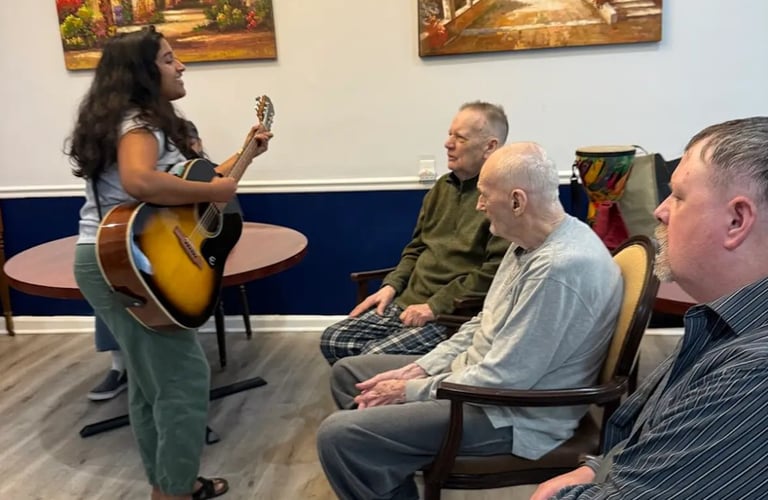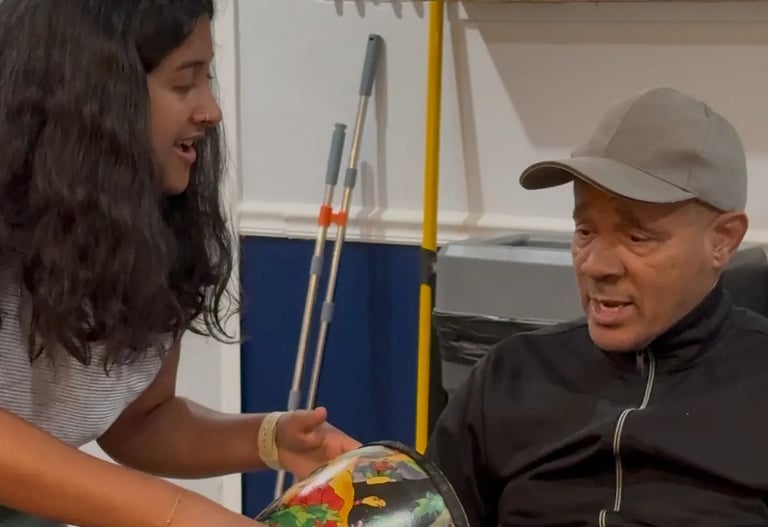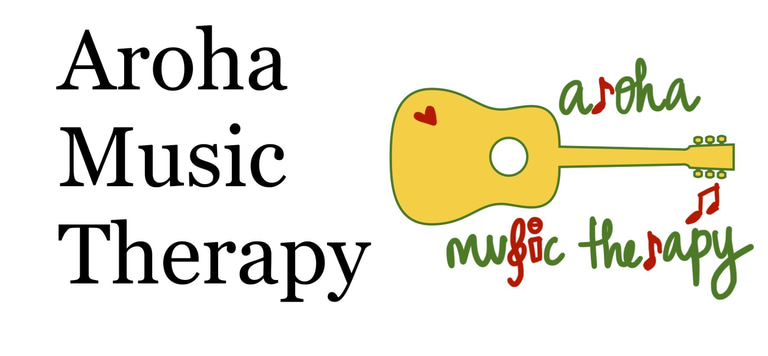Hospice/Palliative/Memory Care
At Aroha, we offer individual and group music therapy services for individuals in hospice, memory care, or palliative care. Music therapy services for this population involves using music to enhance emotional, social, and physical well-being. We can help individuals cope with the challenges of aging, chronic illness, and end-of-life transitions. Music therapy is non-invasive form of therapy that can be integrated into a care plan to provide comfort, alleviate symptoms, and enhance emotional expression in a non-threatening and soothing environment.


Who can benefit from music therapy?
Older Adults with Chronic Illness (Palliative Care):
For individuals with chronic, progressive illnesses (e.g., Alzheimer's, Parkinson's, cancer, heart disease), music can reduce anxiety, improve mood, and promote a sense of dignity and control.Older Adults with Cognitive Decline (Dementia/Alzheimer's):
Using music therapy, we can stimulate memory, reduce agitation, improve sleep patterns, and encourage communication in individuals with dementia, Alzheimer’s, and other age-related cognitive impairments.Terminally Ill Patients (Hospice):
Music therapy provides emotional and spiritual support, helping individuals cope with fear, anxiety, and grief as they approach the end of life. We can also improve physical comfort by helping manage symptoms such as pain, nausea, and shortness of breath.
How can they benefit from services?
Emotional and Spiritual Support:
Music offers an opportunity for expression and emotional release, helping patients process feelings of fear, sadness, and grief. Music can also provide a sense of spiritual comfort and peace, especially when songs with religious or meaningful lyrics are included.Facilitate Life Review and Legacy Work:
We can use music as a means of reflection, helping individuals in hospice or palliative care process their life story or legacy through song, encouraging a sense of closure or fulfillment.Improved Mood and Anxiety Reduction:
Using familiar songs, we can elevate mood, calm restlessness, and reduce anxiety, providing a peaceful, soothing environment.Memory and Cognitive Stimulation:
For older adults, particularly those with dementia or Alzheimer's, familiar songs can help trigger memories, stimulate cognitive function, and improve focus. This can be especially beneficial for those in memory care, as their loved ones cherish getting to see the residents alert and oriented. We can also improve verbal expression and communication, helping individuals reconnect with family members and caregivers.Pain and Symptom Management:
Music therapy has been shown to reduce pain, nausea, and discomfort by promoting relaxation and altering pain perception. We can also help alleviate symptoms of anxiety, depression, or agitation.Social Connection and Comfort:
Group music therapy sessions or family-focused music interventions can help foster social interaction, reduce feelings of isolation, and strengthen family bonds.


Assisted Living Facilities
At Aroha, we offer individual and group music therapy services for individuals at assisted living facilities, where we meaningfully engage residents, enhance their quality of life, and provide comfort in a non-invasive way. Our services can address a wide range of cognitive, emotional, and physical needs. Music therapy can help older adults improve their well-being, maintain independence, and stay engaged with their environment and social circles. Music therapy in these settings can be particularly valuable for individuals with Alzheimer's, Dementia, mobility issues, or social isolation.
End-of-Life Care:
For residents in palliative or hospice care, we can offer comfort, opportunities for emotional expression, and a peaceful environment, helping residents and their families find peace in the final stages of life.Residents with Physical Disabilities:
For individuals with physical impairments or mobility challenges, using music therapy, we can improve motor coordination, balance, and overall physical functioning through rhythm and movement activities.Seniors with Cognitive Impairments:
Residents with Dementia, Alzheimer's, or other cognitive decline conditions benefit from music therapy through memory stimulation, emotional expression, and connection with their past.Socially Isolated Seniors:
Group/individual music therapy provides a sense of community and social interaction for residents who may feel isolated, improving their mental and emotional well-being and encouraging participation in group activities.Those with Emotional or Mental Health Concerns:
Residents who struggle with anxiety, depression, or stress can experience mood improvements, emotional regulation, and a sense of relief from distressing symptoms through music-based interventions.
Who can benefit from music therapy?
How can they benefit from services?
Emotional Expression and Mood Improvement:
Using music therapy, we can help residents express emotions they may find difficult to verbalize. Music therapy also helps alleviate symptoms of anxiety, agitation, and depression by improving mood and providing an outlet for feelings.Memory and Cognitive Stimulation:
Music has a direct connection to memory. For individuals with Alzheimer's or dementia, familiar songs and melodies can trigger memories and help residents engage cognitively. We can support language skills, recognition, and cognitive function through song lyrics and rhythm.Physical and Motor Skill Improvement:
Using rhythm and movement, we can help improve motor coordination, fine and gross motor skills, and balance. Residents can participate in gentle movement exercises, dancing, or playing instruments to maintain or enhance physical abilities.Social Interaction and Community Building:
Group music therapy fosters interaction and connection among residents, creating a sense of belonging and reducing feelings of loneliness or isolation. We can also encourage cooperative engagement in group music-making, such as singing, drumming, or playing instruments together.Spiritual and Cultural Connection:
We can integrate culturally significant or religious music that has personal meaning to residents, supporting emotional and spiritual well-being and allowing individuals to connect with their past or faith traditions.Stress Reduction and Relaxation:
In music therapy, we use their preferred songs to provide a sense of comfort. This can help reduce stress levels, lower blood pressure, and promote relaxation, especially for individuals who experience anxiety or agitation.
